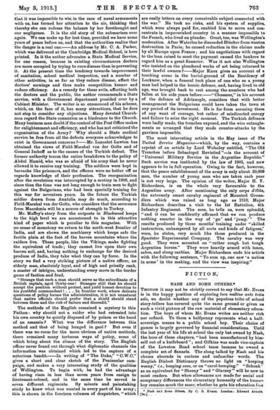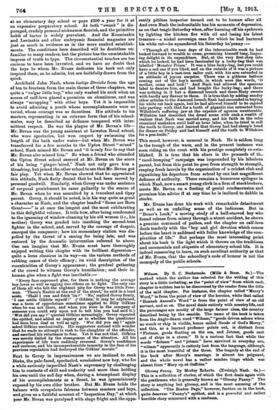FICTION.'
NASH AND SOME OTHERS.*
THOUGH it may not be strictly correct to say that Mr. Evans is in the happy position of exploring loco nulling ante trila solo, we doubt whether any of the populous tribe of school story-tellers has covered quite the same ground or given us such a vivid picture of the raw material of elementary educa- tion. The boys of whom Mr. Evans writes are neither rich nor refined. To them a halfpenny represents what a half- sovereign means to a public school boy. Their choice of games is largely governed by financial considerations. Until the last year of his life at school the only bat owned by Nash, the hero of these chapters, "had been manufactured by him- self out of a knifeboard "; and Gifkins was made vice-captain of the Lowston Road school team because he owned a complete set of flannels. The slang talked by Nash and his chums abounds in curious and unfamiliar words. The English Dialect Dictionary throws no light on "keeping weeny," i.e., keeping cave, or on "carol-born ping." " Schonk as an equivalent for " Sheeny " and " Glarney " will be new to most readers. But when allowances are made for social and sumptuary differences the elementary humanity of the human boy remains much the same, whether he gets his education free • Nash ani Some Othars. By C. S. Evans. London: Edward Amok*. CGe•] -
at an elementary day school or pays R,200 a year for it at an expensive preparatory school. At both "swank " is dis- paraged, crudely personal nicknames flourish, and the primitive habit of barter is widely prevalent. And the Kosminskis and Levinskis and other embryonic financial magnates are just as much in evidence as in the more exalted establish- ments. The conditions here described will be doubtless un- familiar to many readers, but the picture has the unmistakable impress of truth to type. The circumstantial touches are too curious to have been invented, and we have no doubt that the boys to whom Mr. Evans dedicates his book not only inspired them, as he admits, but are faithfully drawn from the quick.
Archibald John Nash, whose lustige Streiche from the age of ten to fourteen form the main theme of these chapters, was quite a "vulgar little boy," who only washed his neck when an access of calf-love placed a premium on cleanliness, and was always " scrapping " with other boys. Yet it is impossible to avoid admiring a youth whose accomplishments were so varied, whose courage was so dauntless. His attitude to his masters, representing in an extreme form that of his school- mates, may be described as defiance tempered with inter- mittent respect. He was the plague of Mr. Bevan's life— Mr. Bevan was the young assistant at Lowston Road school, who wore spectacles, but won respect by swimming the length of the bath under water—but when Mr. Bevan was transferred for a few months to the Upton Street " mixed" school, Nash missed Mr. Bevan and "it is only fair to say that Mr. Bevan also missed him." So when a friend who attended the Upton Street school sneered at Mr. Bevan on the score of his being " ginger-'aired," Nash not only gave him a thrashing, but joined the other school to see that Mr. Bevan got fair play. Yet when Mr. Bevan showed that he appreciated this attitude, Nash flatly denied that he had been moved by personal goodwill. Similarly, when Govey was under sentence of corporal punishment he came gallantly to the rescue of Mr. Bevan when he was assaulted by a truculent and tipsy parent. Govey, it should be noted, is in his way quite as great a character as Nash, and the chapter headed " Some are Born Great—" is at once the longest and the most exhilarating in this delightful volume. It tells how, after being condemned to the ignominy of window-cleaning by his old woman (i.e., his mother) Govey was goaded into insulting the second-best fighter in the school, and, nerved by the courage of despair, emerged the conqueror; how his momentary elation was dis- pelled by the threat of a caning for being late, and was restored by the dramatic intervention referred to above. One can imagine that Mr. Evans must have thoroughly enjoyed writing this chapter with its brilliant digression— quite a locus classicus in its way—on the various methods of robbing canes of their efficacy ; its vivid description of the eccentricities of Govey's appearance ; the gradual gathering of the crowd to witness Govey's humiliation ; and their in- human glee when a fight was inevitable :—
" Every face expressed glee, for there is nothing the average boy loves so well as egging two others on to fight. The only one of them all who felt the slightest pity for Govey was little Free- man. 'There's Nashie at the end of the street,' he said in a loud aside. ' Shall I run and fetch 'im ?" No,' replied Govey firmly, • I can settle Giblets myself !' (` Giblets,' it may be explained, was a term of opprobrium sometimes applied to Billy Gifkins when he was not there, and when you were in the company of someone you could rely upon not to tell him you had said it.) • Wot did you say ? ' queried Gifkins menacingly. Govey repeated the epithet, and added an inquiry as to whether the questioner had been born deaf as well as ugly. Wet did you say ?' again asked Gifkins mechanically. His supporters noticed with wonder that he made no attempt to rush to the slaughter of the offender, and ascribed his reluctance to fear. Yet it was not that. Gifkins was merely dulled by the strangeness of the situation. All his experiences of life were suddenly reversed. Covey's confidence and coolness, and his incomprehensible temerity in the face of his previous reputation had destroyed the Gifkins' morale."
Next to Govey in impressiveness we are inclined to rank Binks, the pale-faced, spectacled, nonchalant new boy, who for a while seriously imperilled Nash's supremacy by challenging him to contests of skill and audacity and more than holding his own until the sad day when, during a triumphant display of his accomplishments as a Scout, he was ignominiously exposed by his own elder brother. But Mr•. Evans holds the balance with scrupulous fairness between masters and boys, and gives us a faithful account of "Inspection Day," at which poor Mr. Bevan was paralysed with stage fright and the appa-
rently pitiless inspector turned out to be human after all And even Nash the indomitable has his moments of depression, as on that tragic Saturday when, after burning off his eyebrows by lighting the kitchen fire with oil and losing his latest
treasure—a nickel sovereign case for which he had bartered his white rat—he squandered his Saturday ha'penny :—
"Through all the lean days of the interminable week ho had looked forward to wealth to come, promising himself long, linger- ing delight in its expenditure. But, at the very first shop into which he looked, he had been fascinated by a lucky-bag that was labelled Monster Prizes? It was a blue lucky-bag, but you could have a red one if you liked, and on the outside of it was a picture of a little boy in a cast-iron sailor suit, with his arm extended in an attitude of joyous surprise. There was a gibbous balloon coming out of the boy's mouth, in which wore the words, 0 mother, come and look ! ' And Nash had allowed the specious label to deceive him, and had bought the lucky-bag ; and there was nothing in it but a diamond brooch and three flinty sweets with hardly any flavour to them. It is true that by adding sundry other articles to the diamond brooch Nash had succeeded in buying his white rat back again, but he had allowed himself to be cajoled into parting with that for a tooth of gigantic size extracted from Wiltshire's suffering jaw at tho expense of agonies unutterable. Wiltshire had described the dread scene with such a wealth of realism that Nash was carried away, and his faith in the relic remained unshaken until half an hour later, when he tried to sell the tooth to Govey, and learned that Govey had had sheep's head for dinner on Friday and had himself sold the tooth to Wiltshiro for a pen-knife."
This mood, however, is unusual in Nash. He is seldom long in the trough of the wave, and in the present instance was soon riding on the crest with his prestige completely re-esta- blished. It is true that his share in the proceeds of th,. " carol-bomping " campaign was impounded by his bibulous parent, but from this point he goes from strength to strength, reaping fresh laurels by the organization of a cricket club and signalizing his departure from school by one last magnificent defiance of authority. There remains a humorous epilogue in which Nash, now a smart young clerk in a firm of stockbrokers, meets Mr. Bevan on a footing of genial condescension and promises him advice if at any time he is inclined to dabble in stocks.
Mr. Evans has done his work with remarkable detachment as well as an unfailing sense of the ludicrous. But in "Boxer's Luck," a moving study of a half-starved boy who found release from misery through a, street accident, he shows a genuine command of pathos, and the chapter on calf-love deals tenderly with the "boy and girl devotion which comes before the heart is saddened with fuller knowledge of the com- plexities of life." But perhaps the most interesting point about his book is the light which it throws on the traditions and ceremonials and etiquette of elementary school life. It is indeed reassuring to learn, on such excellent authority as that of Mr•. Evans, that the schoolboy's code of honour is not the monopoly of the public schools.



















































 Previous page
Previous page